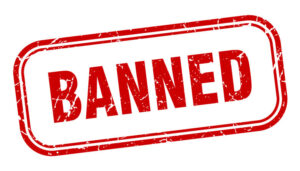
Well, the forbidden words list in the USA is growing this year. That is, forbidden words in the US government. Censored words. Some of the many words: climate change (yes, it exists), clean energy (e.g., wind), global warming (temperatures are increasing, with new records being set continuously), water pollution, air pollution, solar energy, gender (we are all a gender), transgender, abortion. And on and on. Denying something's existence doesn't make it not exist.
The words are not allowed on government sites, in grant proposals, grant applications, or in research. Different government departments have different banned words lists (e.g., 110 words or phrases in the US Dept. of Agriculture research service - such as clean water, microplastics) Who knew that in 2025 that censorship would be so large scale? Yes, this is an attack on knowledge, on research, on medicine, and science. On all of us.
3 articles about the large-scale censorship. From NPR: Energy Dept. tells employees not to use words including 'climate change' and 'green'
The Department of Energy has told employees to avoid using certain words, including "climate change," "green" and "sustainable," according to an internal email sent to staff and obtained by NPR.
The details of the email were first reported by Politico. It was sent to employees of the Energy Department's Office of Energy Efficiency and Renewable Energy, which is the largest federal funder of clean energy technology.
The email obtained by NPR instructs employees working on energy efficiency and renewable energy projects to avoid using about a dozen words and phrases, many of which are central to their work.
The banned phrases include: "climate change," which is primarily caused by humans burning oil, gas and coal, "decarbonization," a common term in energy policy and research that refers to reductions in carbon dioxide pollution, "clean energy," which is often used to refer to solar, wind and other sources of electricity that do not rely on fossil fuels, "energy transition," which generally refers to the economy-wide shift away from oil, gas and coal that is already taking place as governments and corporations try to reduce planet-warming pollution.
The email warns employees to avoid using the words in all parts of their work. The prohibition extends to the Energy Department website, internal reports and public documents, including those that describe federal funding opportunities.
The move is part of a larger effort by the Trump administration to restrict access to information about climate change and undercut federal efforts to address its causes. The administration has canceled billions of dollars in research funding and shuttered federal websites that made public critical data about sea level rise, extreme weather and other effects of climate change. Scientists who advise the government about clean air and clean water regulations have also been let go, as have scientists who were synthesizing the latest research about how climate change affects the United States.
Excerpts from the investigative journalism site Investigate Midwest: ‘Clean water,’ ‘equity,’ ‘microplastics’ and other words banned in leaked USDA memo
On the day of his inauguration, President Donald Trump claimed his administration would end the “censorship of protected speech.” But actions speak louder than words. Thanks to a leaked email memo, we now know the Trump administration has drawn up a list of 110 words and phrases that have now been banned from use in the Agricultural Research Service (ARS).
[Some banned terms below. They vary by department.]
Pollution remediation banned terms: runoff, membrane filtration, microplastics, water pollution, air pollution, soil pollution, groundwater pollution, pollution remediation, pollution abatement, sediment remediation, contaminants of environmental concern, CEC, PFAS, PFOA, PCB, nonpoint source pollution
Clean-energy banned terms: clean power, clean fuel, alternative energy, geothermal, solar energy, solar power, photovoltaic, agrivoltaics, wind power, nuclear energy, nuclear power, bioenergy, biofuel, biogas, biomethane, ethanol, diesel, aviation fuel, pyrolysis, energy conversion
Clean transportation banned terms: electric vehicle, hydrogen vehicle, fuel cell, low-emission vehicle
A June 2025 research article about banned words in the US. From the journal Health and Human Rights: Trump’s Banned Words and Disastrous Health Policies
Since his inauguration, President Trump has launched a blizzard of executive orders upending government programs affecting science, public health, the environment, trade, education, sports, and more. As part of these efforts, he has authorized a new list of banned words: gender, transgender, pregnant person, pregnant people, LGBT, transsexual, non-binary, nonbinary, assigned male at birth, assigned female at birth, biologically male, and biologically female.5
These are words that Trump demanded be eliminated from the US Centers for Disease Control’s website, erasing not only identities but also critical information on the health status and health inequities of often vulnerable populations. The orders also limit the ability of public health professionals, within the US government and outside of it, to implement programs and conduct research to ensure that everyone’s health needs are met.
Trump’s campaign against these words is part of a much larger effort to upend public health and health care in the United States and globally. It is as much a war against words as it is a war against science and against the progress that has been made over decades building global partnerships to advance the right to health.
Trump’s recent executive orders and the actions of his administration also imperil the health of all Americans. Withdrawing the country from the World Health Organization will interfere with its ability to defend the United States against future pandemics. Withdrawing from the Paris Agreement on climate change makes us more vulnerable to the climate-related catastrophes measured in lives and in GDP that are already occurring. Ending diversity, equity, and inclusion programs makes it harder for public health workers to represent and work with the communities they serve and to fight back against misinformation and disinformation.13
